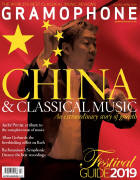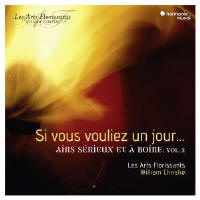Texte paru dans: / Appeared in: |
|
|
Outil de traduction (Très approximatif) |
|
|
Reviewer:
William Yeoman Note that the simple, elegant air de cour would eventually form part of the basis for French Baroque opera. And that the first work on this second volume of airs de cour from Les Art Florissants, Marc-Antoine Charpentier’s 1676 Petite pastorale, Églogue de Bergers, largely comprises diverse pre-existing material from the composer’s oeuvre, woven together to form a new whole. You’ll then understand how one could see William Christie’s conceit of a troupe rehearsing Charpentier’s Italianate Pastoraletta as a delicious semi-staged pasticcio, the interspersed airs de cour of Étienne Moulinié, Michel Lambert and Sébastien Le Camus representing the players’ interpersonal intrigues. This follows the pattern set by the first volume. That programme was built around the story of a marriage. This time the theme is Virgil’s ‘omnia vincit amor’, or, as Charpentier’s Pastoraletta has it, ‘Amor vince ogni cosa’: love conquers all. There are, though, plenty of plaints and prognostications along the way, as nymphs and shepherds variously bewail and celebrate their situations in a mythical sylvan landscape. In Lambert’s gorgeous Amour, je me suis plaint cent fois (‘Love, I complained a hundred times’), an instrumental introduction gives way to ensemble-singing of great expressive refinement. Elsewhere, solo songs such as Le Camus’s Ah, que vous êtes heureux (‘Oh, how happy you seem’) serve as delicate foils to the emotional upheavals of the main action. Throughout, the young instrumentalists and vocalists alike – and it helps that this is a live recording – respond to Christie’s direction from the harpsichord with freedom and fluency. The expressive ornamentation is particularly fine. |
|




